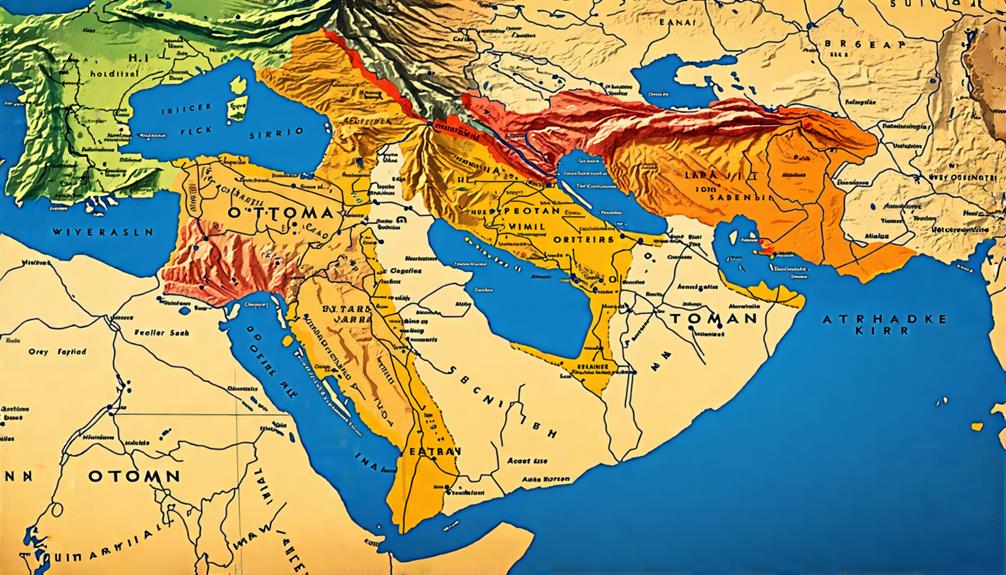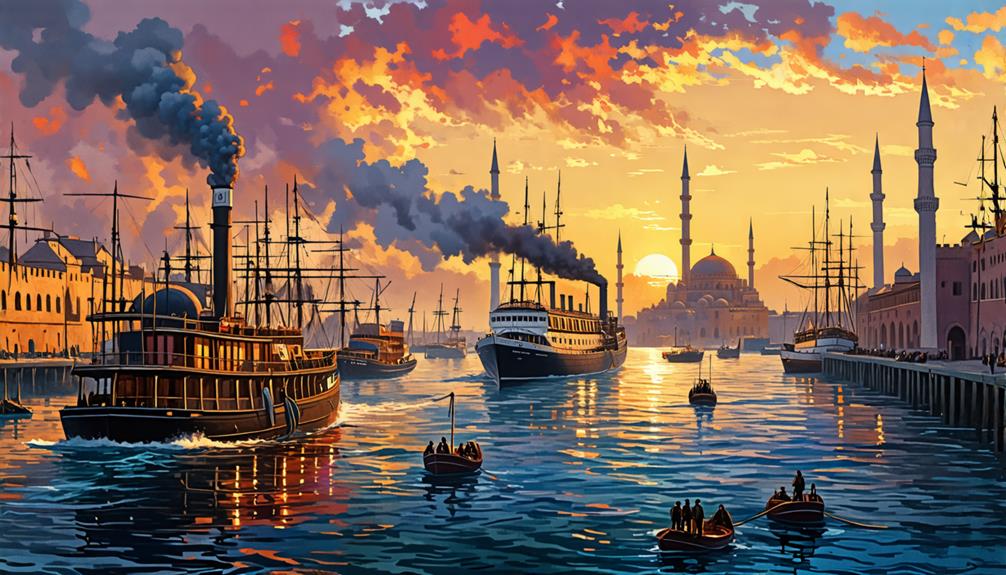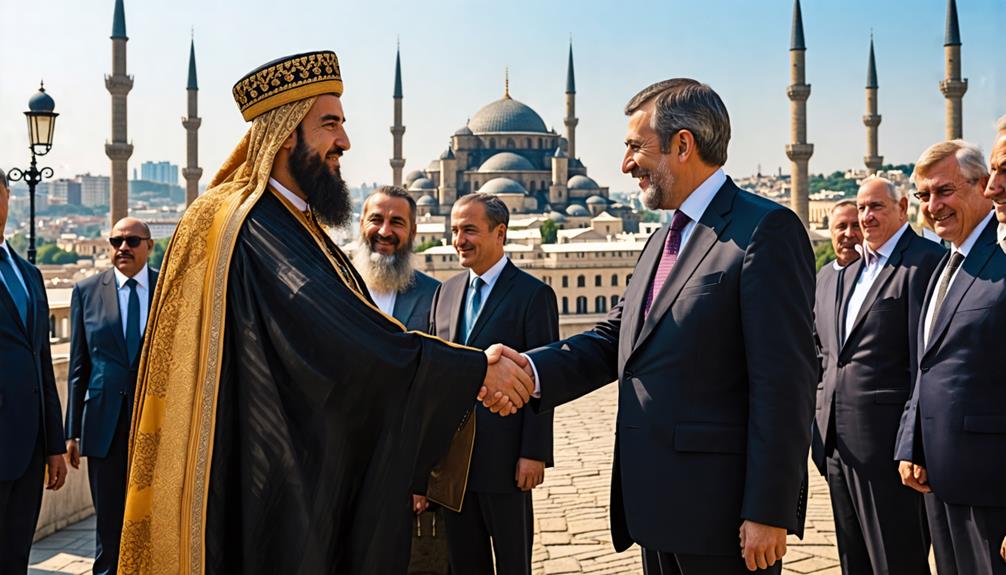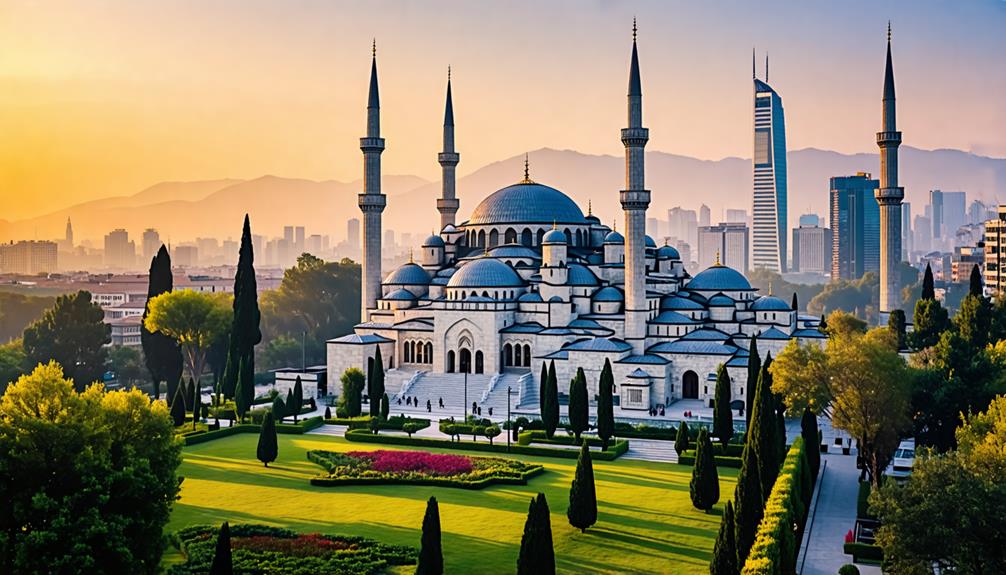Imagine a world where the Ottoman Empire survived World War I intact. The Middle East would be shaped by a single, powerful entity with vast territories.
How would this alternate reality change history? The political, religious, and cultural landscape of the region would be vastly different from what we know today.
Political dynamics would shift dramatically, with a centralized authority potentially stabilizing the region and curbing the rise of nationalism that led to the fragmentation of states.
Religiously, the Ottoman Empire was home to a diverse array of faiths. Its survival might have fostered a more tolerant environment, preventing sectarian conflicts that have plagued the region in our timeline.
Culturally, the preservation of Ottoman governance could have led to a more cohesive cultural identity, blending various traditions rather than the distinct national identities that emerged post-World War I.
Territorial Integrity

In an alternate history where the Ottoman Empire maintained its territorial integrity after World War I, the Middle East would look very different today. The Ottomans would have controlled vast swaths of the Arabian Peninsula, Mesopotamia, and the Levant, preventing the emergence of many modern nation-states that currently exist in the region.
One theory is that this could have significantly altered the geopolitical landscape, regional dynamics, and balance of power in the Middle East. It's possible that without the formation of these nation-states, there would have been less conflict and instability in the region. However, it's also conceivable that new tensions could have arisen within the Ottoman Empire itself.
Interestingly, a similar scenario did occur later in history, albeit on a smaller scale, when Turkey annexed the Hatay State (now Turkey's Hatay Province) from Syria in 1939. This annexation, recognized by France, the mandatory power in Syria at the time, demonstrated how territorial changes can have lasting impacts on regional geopolitics.
Political Landscape
One theory is that the continued existence of the Ottoman Empire could have significantly altered the development of Arab nationalism and the formation of independent Arab states. It's possible that Ottoman rule would have persisted, with the Sultan retaining authority over a large, diverse empire spanning multiple ethnicities.
While this scenario didn't occur due to the Ottoman Empire's collapse after World War I, some historians speculate that a similar situation could have arisen if another power had managed to maintain control over the region. Such changes might've included a delay in the emergence of distinct Arab national identities and a different political map of the Middle East compared to what we see today.
Economic Implications

In an alternate timeline where the Ottoman Empire survived, the economic landscape of the Middle East and surrounding regions could have looked quite different. One theory is that a unified Ottoman economic bloc might've emerged, potentially rivaling Western powers in terms of influence and development.
The Empire's strategic location and vast resources may have facilitated expanded trade routes and partnerships, leading to rapid industrialization and job creation across various sectors. It's possible that agriculture would have seen significant modernization and increased productivity under a surviving Ottoman Empire. Additionally, Istanbul could have developed into a major financial hub, attracting investment and economic activity from around the world.
While this particular scenario involves the Ottoman Empire, similar alternate histories have been explored by others, such as the survival of the Austro-Hungarian Empire or a victorious Confederate States of America. These hypothetical scenarios offer intriguing possibilities for how the world might've developed differently under altered historical circumstances.
Religious Dynamics
If the Ottoman Empire had survived past World War I, the influence of Islam would have likely continued to shape society and politics in significant ways.
However, experts theorize that tensions with minority religious groups such as Christians and Jews may have persisted, posing challenges for Ottoman rulers in managing diversity while maintaining the empire's Islamic character.
It's worth noting that some of the territories formerly belonging to the Ottoman Empire did come under the control of other powers in the aftermath of World War I.
The Treaty of Sèvres in 1920 divided up much of the empire, although it was never fully implemented due to the success of the Turkish War of Independence led by Mustafa Kemal Atatürk.
Diplomatic Relations

In an alternate timeline where the Ottoman Empire remained resilient, it would have faced significant challenges navigating complex diplomatic relations with European powers seeking to expand their influence in the Middle East and North Africa.
One theory is that the Ottomans would have needed to delicately balance competing interests, modernize their empire, and forge strategic alliances to maintain their sovereignty and territorial integrity against growing colonial ambitions.
It's possible that a resilient Ottoman Empire could have meant changes to the region's borders, cultural dynamics, and political landscape, though the extent and nature of these changes remain open to speculation.
Interestingly, some aspects of this scenario did occur at a later date, with Turkey, a successor state to the Ottoman Empire, navigating complex diplomatic relations with European powers and other nations in the region.
Cultural Preservation
In an alternate timeline where the Ottoman Empire endured past World War I, its cultural legacy might've evolved differently. One theory is that the empire's diverse traditions, art, and architecture would have continued developing organically, without the disruptions of forced westernization or fragmentation.
However, it's also possible that internal tensions and external pressures could have still led to significant changes within the empire. The rise of nationalist movements and the influence of modernization might've reshaped Ottoman culture in unexpected ways.
Interestingly, some aspects of this scenario did play out later in history, such as the Soviet Union's attempts to preserve and promote the cultures of its constituent republics.
Ultimately, the impact of a surviving Ottoman Empire on cultural preservation remains an intriguing 'what if' for historians and enthusiasts to ponder.
Conclusion
You can imagine the contrasts – unity and division, tradition and modernity, East and West.
The Ottoman Empire's survival would've reshaped the Middle East's identity, blending Islamic heritage with European influence.
Economic ties could've flourished while ethnic tensions simmered.
Religious pluralism might've coexisted with minority challenges.
It's a world of 'what ifs' – alluring yet uncertain, familiar yet foreign – where the region's destiny hangs in the balance of an empire's endurance.

Leave a Reply